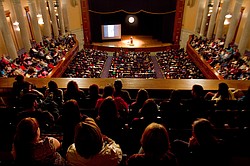After 50 years, Jane Goodall sees hope amid destruction
By SEAN BARRON
news@vindy.com
YOUNGSTOWN
Jane Goodall at Stambaugh Auditorium

Geoffrey Hauschild|The Vindicator Jane Goodall gives a presentation at Stambaugh Auditorium on Tuesday evening, entitled "Gombe and Beyond: The Next 50 Years," commemorating the 50th anniversary of her living amongst and studying Chimpanzees while living in Gombe, Tanzania.
Dr. Jane Goodall is saddened and disheartened by what she sees as many destructive changes to the planet in the 50 years since beginning her ground-breaking research of chimpanzees in Gombe, Tanzania.
But overshadowing those feelings is tremendous hope.
And it was that hope, along with her knowledge and insights related to chimpanzees, that formed the crux of her 90-minute presentation, “Gombe and Beyond: The Next 50 Years,” Tuesday night at Stambaugh Auditorium on the city’s North Side.
Speaking to a filled auditorium of about 2,700, the famous 76-year-old primatologist, anthropologist and conservationist shared her findings on family groups of African chimpanzees, including how the animals and humans are alike. Goodall also talked about how she’s gotten many young people interested in projects to benefit the environment and improve the lives of people and animals.
Chimpanzees and humans share similar biological traits and immune systems and have roughly the same size brain, said Goodall, who was designated a United Nations Messenger of Peace. Like people, the animals also have the ability to use nonverbal communication and often communicate with one another by touches and embraces, she continued.
“I’m amazed about how they can do things we once thought only we could do,” she said, referring to the animals’ resourcefulness.
Chimpanzees, however, also can be violent by attacking and leaving to die certain members of other chimpanzee communities, behavior that in some ways mirrors their human counterparts, Goodall noted.
“If you look around, every community around the world can show aggression,” she added.
Since 1960, the chimpanzee population has decreased drastically, largely because of habitat destruction, an increase in the number of people, and commercial hunting for food and profit, she noted. In the 1990s, Goodall flew over Tanzania and was shocked to see the amount of deforestation that had taken place, she said.
In addition to working on behalf of the animals, the Jane Goodall Institute, a global nonprofit organization she founded in 1977, has trained many Tanzanian villagers in sustainable agriculture and forestry. The institute also helps women who have suffered discrimination, as well as villagers facing “crippling poverty,” in part by providing fresh drinking water and showing them ways to make their land as productive as possible, she noted.
Many of the problems Africa faces are linked to those in Europe, the United States and elsewhere, she pointed out. For example, many parts of the world have seen the disappearance of vast areas of rain forests, which many experts say leads to detrimental climate changes, Goodall explained.
“We really have conspired together to create a very, very damaged Earth,” she added.
Over the years, Goodall said, her travels have brought her to many youngsters who she says were disillusioned and apathetic, mainly because they felt their future had been compromised. Nevertheless, hundreds of thousands of young people in about 120 countries now feel empowered because of a global network she founded in 1991 called Roots & Shoots, she told the audience.
Roots & Shoots encourages children, teenagers and college-age students to make positive changes for people, animals and the environment by providing opportunities every year to complete thousands of service projects related to all three.
“Every single one of us makes a difference every day,” she said, referring to Roots’ main message.
It’s critical that more people realize the everyday choices they make and food they eat, for example, have consequences beyond themselves, and that they re-evaluate misplaced priorities.
“We need money to live, at least in this society, but we shouldn’t live for money,” she said to applause.
Despite enormous challenges that remain, Goodall said she derives hope largely by working with young people and appreciating the resilience of nature and land to repair themselves, as well as the “indomitable human spirit” that allows people to overcome major social problems, disabilities and countless other odds.
 43
43
